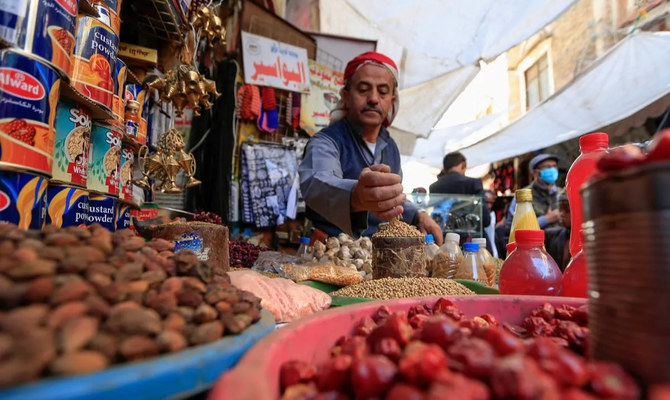AL-MUKALLA: Two major umbrella organizations for Yemeni businesspeople have accused the Iran-backed Houthis of harassing traders in areas under their control through the imposition of illegal levies, the confiscation of their products, and other means.
In a strongly worded statement, the Federation of Yemen Chambers of Commerce and Industry and the Sanaa Chamber of Commerce and Industry have complained that the Houthi Ministry of Industry and Trade closed businesses without legal justification, seized vehicles carrying goods for traders in Houthi-controlled areas, tampered with and even sold those goods by force, and imposed a pricing list of items without consulting traders.
The two organizations criticized the Houthis for “seizing goods-laden vehicles without legal justification, forcibly opening them, disposing of the goods, and selling them by force.”
Dozens of lorries carrying vital products, such as flour, have become stranded outside Houthi checkpoints in Al-Bayda, Taiz, and Sanaa, as the Houthis have prohibited Yemeni businesses from importing goods. Yemeni traders say the Houthi action ruined their goods and cost them millions of dollars in losses.
In addition to obstructing the movement of their goods, the Houthis imposed fixed prices on traders and did not adjust prices even after the war in Ukraine, when imported goods were priced higher.
They also delayed for months the issuance of new business licenses or the renewal of existing ones.
Traders referred to the Houthi ministry’s actions as a “hanging sword” and warned that they would force businesses to fail and force others to abandon their communities.
“These practices cause losses and destruction to national companies and are considered an economic catastrophe that will affect the economic sector and market balance,” the Yemeni traders said in their statement.
The practices “will lead to the suspension of imports and the disruption of the country’s strategic stock, and their continuation will lead to the displacement and migration of national capital in search of commercial and economic security,” the statement added.
Yemeni economists argue that the Yemeni private sector, which has historically avoided conflicts with the Houthis, has decided to react this time as Houthi measures threatened to shut down their operations.
“This statement’s language indicates that (Houthi) practices, violations, and procedures have reached a level that threatens the private sector and national capital, as well as the significant business groups that have operated in Yemen for decades,” Mustafa Nasr, director of the Studies and Economic Media Center, told Arab News.
“It appears that the situation has spiraled out of control and that the private sector is no longer able to remain mute.”
Yemenis believe that Houthis are harassing the private sector in their areas of control in order for their budding private sector to grow and thrive.
In March, the Houthis kidnapped Abdullah Ahmed Al-Hutheily, the owner of a large oil transportation, logistics, and oil-related services company based in Sanaa, for allegedly breaching their ban on working in government-controlled oil fields.
However, according to other Yemeni journalists and economists, despite their growing resentment against Houthi measures in Sanaa and other cities under Houthi control, businesspeople would not relocate their operations to government-controlled areas because the majority of their customers are in Houthi-controlled provinces and the Yemeni government in Aden offers no incentives.
“At the moment, it is difficult for any trader to leave Sanaa and travel to Aden because more than 80 percent of Yemen’s population lives in Houthi-controlled territories,” Fatehi bin Lazerq, editor of Aden Al-Ghad newspaper, told Arab News.
He added that the Yemeni government’s 50-percent hike in the US dollar exchange rate, along with security concerns, would deter firms from relocating to Aden.




























